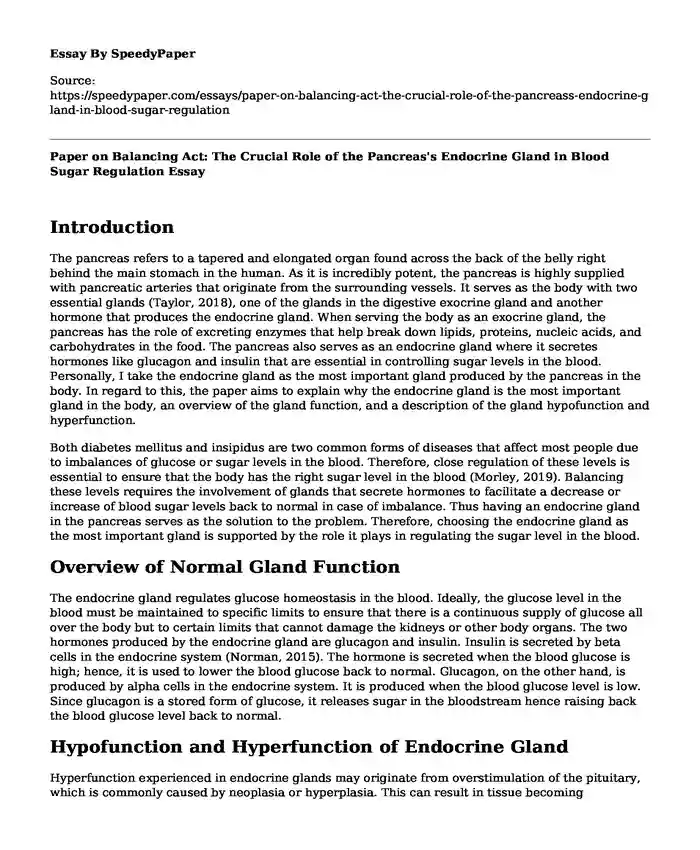
| Type of paper: | Essay |
| Categories: | Health and Social Care |
| Pages: | 3 |
| Wordcount: | 721 words |
Introduction
The pancreas refers to a tapered and elongated organ found across the back of the belly right behind the main stomach in the human. As it is incredibly potent, the pancreas is highly supplied with pancreatic arteries that originate from the surrounding vessels. It serves as the body with two essential glands (Taylor, 2018), one of the glands in the digestive exocrine gland and another hormone that produces the endocrine gland. When serving the body as an exocrine gland, the pancreas has the role of excreting enzymes that help break down lipids, proteins, nucleic acids, and carbohydrates in the food. The pancreas also serves as an endocrine gland where it secretes hormones like glucagon and insulin that are essential in controlling sugar levels in the blood. Personally, I take the endocrine gland as the most important gland produced by the pancreas in the body. In regard to this, the paper aims to explain why the endocrine gland is the most important gland in the body, an overview of the gland function, and a description of the gland hypofunction and hyperfunction.
Both diabetes mellitus and insipidus are two common forms of diseases that affect most people due to imbalances of glucose or sugar levels in the blood. Therefore, close regulation of these levels is essential to ensure that the body has the right sugar level in the blood (Morley, 2019). Balancing these levels requires the involvement of glands that secrete hormones to facilitate a decrease or increase of blood sugar levels back to normal in case of imbalance. Thus having an endocrine gland in the pancreas serves as the solution to the problem. Therefore, choosing the endocrine gland as the most important gland is supported by the role it plays in regulating the sugar level in the blood.
Overview of Normal Gland Function
The endocrine gland regulates glucose homeostasis in the blood. Ideally, the glucose level in the blood must be maintained to specific limits to ensure that there is a continuous supply of glucose all over the body but to certain limits that cannot damage the kidneys or other body organs. The two hormones produced by the endocrine gland are glucagon and insulin. Insulin is secreted by beta cells in the endocrine system (Norman, 2015). The hormone is secreted when the blood glucose is high; hence, it is used to lower the blood glucose back to normal. Glucagon, on the other hand, is produced by alpha cells in the endocrine system. It is produced when the blood glucose level is low. Since glucagon is a stored form of glucose, it releases sugar in the bloodstream hence raising back the blood glucose level back to normal.
Hypofunction and Hyperfunction of Endocrine Gland
Hyperfunction experienced in endocrine glands may originate from overstimulation of the pituitary, which is commonly caused by neoplasia or hyperplasia. This can result in tissue becoming hypersensitive to hormones. On the other hand, Hypo function results from the pituitary experiencing under stimulation (TampaHospital, 2016). Genetic disorders are linked with the condition, which is mostly caused by gene deletion or abnormal hormones being produced.
Clinical Manifestation
Symptoms of Endocrine disorders can be insidiously making them nonspecific and hard to observe. Furthermore, clinical manifestation or recognition may be delayed and take months or even years to recognize. Therefore, biochemical diagnosis is the preferred analysis of the patient. It involves checking blood levels of the pituitary hormone endocrine or both.
Causes of Dysfunction
The main dysfunction of the endocrine gland is the failure to produce or secrete insulin or glucagon hormones. These dysfunctions of the Endocrine are caused by damage to the endocrine gland, genetic disorders, body infections affecting hormone levels, or tumors in one or more than two endocrine glands (TampaHospital, 2016).
Conclusion
To sum up, the endocrine system plays a significant role in the human body. The gland that secretes both insulin and glucagon are more important as they regulate blood sugars. People should have frequent visitations to the hospital for body checkups, as the symptoms of endocrine glands are hard to recognize.
References
Morley, J. (2019). Overview of Endocrine Disorders - Endocrine and Metabolic Disorders. MSD Manual Professional Edition. https://www.msdmanuals.com/professional/endocrine-and-metabolic-disorders/principles-of-endocrinology/overview-of-endocrine-disorders
Norman, J. (2015). Normal Regulation of Blood Glucose. EndocrineWeb. https://www.endocrineweb.com/conditions/diabetes/normal-regulation-blood-glucose
Tampa Hospital. (2016). Endocrine Disorder Causes | Tampa General Hospital. Www.Tgh.Org. https://www.tgh.org/services/diabetes-endocrinology/endocrine-disorder-causes
Taylor, T. (2018). Pancreas Gland - Endocrine System. inner body. https://www.innerbody.com/image/endo03.html
Cite this page
Paper on Balancing Act: The Crucial Role of the Pancreas's Endocrine Gland in Blood Sugar Regulation. (2023, Dec 10). Retrieved from https://speedypaper.com/essays/paper-on-balancing-act-the-crucial-role-of-the-pancreass-endocrine-gland-in-blood-sugar-regulation
Request Removal
If you are the original author of this essay and no longer wish to have it published on the SpeedyPaper website, please click below to request its removal:
- Essay Example on Amnesia Disorder to Healthy Memory
- Healthcare Management Intermountain Healthcare (IHC). Paper Example
- Essay Sample on Diet and Mental Disorder
- Essay Sample on Cell Phone Technology
- Athletes & ACL Injuries: Risk & Prevention - Essay Sample
- Free Essay. Effect of How Telehealth Is Transforming How Care Is Done at NY Presbyterian
- Understanding Type 2 Diabetes: Pathology, Risk Factors, Symptoms, and Treatments - Essay Example
Popular categories




